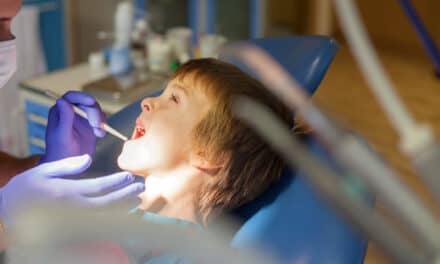The CDC is asking dental professionals to look for oral lesions and other signs of monkeypox and refer patients for testing if necessary.
The Centers for Disease Control and Prevention is urging health care providers to be aware of patients with symptoms consistent with monkeypox, including oral lesions, and refer them for testing.
Monkeypox is caused by the monkeypox virus and is a relative of the virus that causes smallpox. Its symptoms are similar to smallpox symptoms but milder, and the disease is rarely fatal.
Symptoms include a rash that can appear on various parts of the body, including inside the mouth and on the face, as well as fever, headache, muscle aches, backache, swollen lymph nodes, chills, exhaustion and respiratory symptoms, including sore throat, nasal congestion and cough.
Monkeypox most commonly spreads through direct contact with body fluids or sores on the body of someone who has monkeypox or with materials or surfaces that have touched body fluids or sores.
The disease can also spread through respiratory secretions when people have prolonged face-to-face contact, although long-range airborne transmission similar to COVID-19 has not been reported, according to the CDC.
While the CDC says prior studies of monkeypox outbreaks show transmission by respiratory secretions appears uncommon, scientists are still researching how often this occurs and when a person with monkeypox symptoms might be more likely to spread the virus through respiratory secretions.
“Dentists have provided care using standard infection control precautions for several decades now, and the enhanced protocols implemented during the COVID-19 pandemic will continue to keep our patients and staff safe during this monkeypox emergency,” said Ana Karina Mascarenhas, BDS, DrPH, chair of the ADA Council on Scientific Affairs. “Use of appropriate PPE including masks and gloves, surface cleaning, and extra diligence when examining patients for symptoms and the characteristic facial rash and intraoral lesions to identify a patient early are imperative.”
As of Aug. 5, there were 7,510 cases of monkeypox in the U.S., according to the CDC. The World Health Organization declared the outbreak a public health emergency of international concern on July 23, and the Biden administration followed with a public health emergency declaration on August 4.
There are two vaccines that can be used to prevent monkeypox infection: JYNNEOS, which was approved for this purpose by the U.S. Food and Drug Administration, and ACAM2000, which was approved by the FDA for use against smallpox and has been made available for use against monkeypox under an expanded access application.
The CDC recommends those who have been exposed to monkeypox or those at higher risk of exposure get vaccinated against monkeypox.
While there are no treatments specifically for monkeypox, antiviral drugs developed for smallpox can also be used to treat monkeypox, according to the CDC.
Photo 247910331 © N Bakker | Dreamstime.com










